Boiler for water heating: an overview of 6 popular options
The heart of any heating system with a liquid coolant is a water heating boiler. It is this device that heats the circulating fluid, which, flowing through radiators, transfers thermal energy to the air in the room, raising the temperature in it.
It is important to choose the right model of equipment in order not to suffer from the cold and not to overpay for the energy consumed. The instructions below will help you with this.
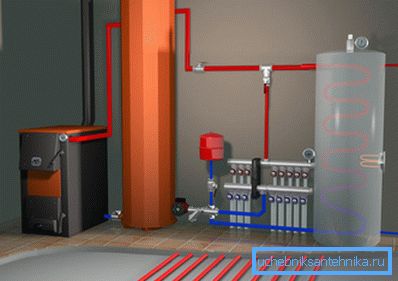
Kinds of boilers
Manufacturers of HVAC equipment constantly struggle among themselves for the attention (and money) of consumers, therefore more and more new water heating boilers appear on the market, working on different types of fuel and having certain design features. In addition, they are distinguished from each other in size, power, price, installation methods and so on.
In addition, there are also universal boilers of Russian-made heating and supplied from abroad. Their use makes it possible to use several sources of energy to heat the coolant: electricity and wood, gas and coal.
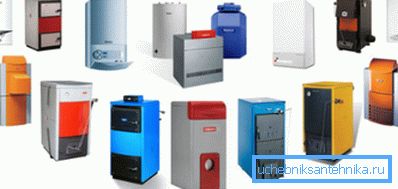
To help you make an informed choice, consider the most common boilers for water heating, which are sold in hardware stores.
Option 1. Gas
Heating boiler, working on the main or gas cylinder, is very common in our country and often used for the manufacture of autonomous heating systems for city apartments and private houses.
This is due to the following advantages:
- profitability - gas is one of the cheapest energy carriers in our country (compared to electricity and diesel fuel);
- high efficiency - most of the energy generated during the combustion of the gas mixture is transferred to the coolant and is used for space heating;
- easy installation - most modern models are small in size and do not require the arrangement of a large vertical directional chimney.
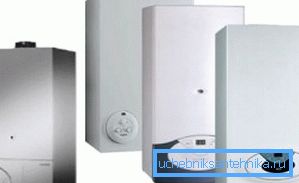
There are the following types of heaters:
- Atmospheric - in this case, the air enters the combustion chamber by gravity. Plus, such a decision - noiseless and independent of electricity, minus - low power, burning oxygen in the room and the need to equip the chimney.
- Turbine - forcing air by using an electric motor. For work, it is required to connect the boiler to the power supply network, but the discharge of combustion products and air intake from the street is made through a small and neat coaxial channel through the wall.
Considering that the operation of gas equipment is associated with increased danger, it is necessary to install a hot-water heating boiler with your own hands, taking into account the following rules:
- Powerful units of floor construction (production and commercial purposes) should be mounted in a separate room - the boiler room - which is equipped with a separate entrance and productive ventilation system.
- When hanging household heaters, the prescribed distance from the structural elements of the building — floor, ceiling, walls, furniture, and so on — should be maintained.
- Fire safety regulations must also be considered.
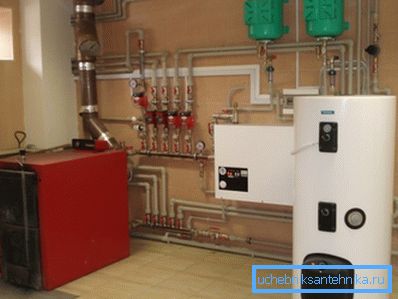
Note! The main disadvantage of using gas boilers is the need to obtain special permits in the supervising state authorities. This procedure is often associated with large time-consuming and many bureaucratic procedures. However, without them, the operation of the heater is impossible.
The production of heating boilers of world brands has been established in the territory of the Russian Federation. Therefore, if you wish, you can buy equipment from leading manufacturers at affordable prices.
Option 2. On electricity
Electric boilers of water heating are also quite popular.
They compare favorably with gas equipment by the following features:
- during the work there are no combustion products requiring disposal;
- they do not need air to function;
- can be installed anywhere in the climate system (in this case, the layout of the heating wiring from the boiler is much simpler, a much smaller number of pipes are required);
- they are small, they do not need any building or plumbing skills;
- work completely silently, since the circulation of the liquid is organized due to the difference in temperature and pressure of the coolant.
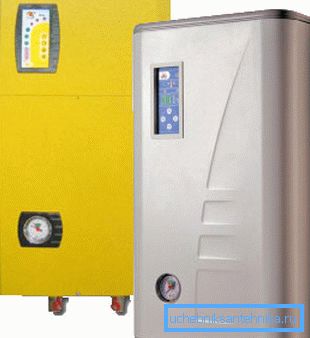
The following disadvantages prevent the widespread use of the described equipment:
- the capacity of most trunk lines (especially in rural areas) is not enough for the normal functioning of the boiler;
- in the event of a power outage, the house or apartment will remain completely without heating;
- The cost of electricity in Russia is much higher than the price of gas or other types of fuel.
Tip! Despite the shortcomings, such a system can be used as a backup. Moreover, there are induction models of heaters that are very compact in size and have excellent efficiency. Production of heating boilers operating on the principle of induction, organized by the domestic company Galan.
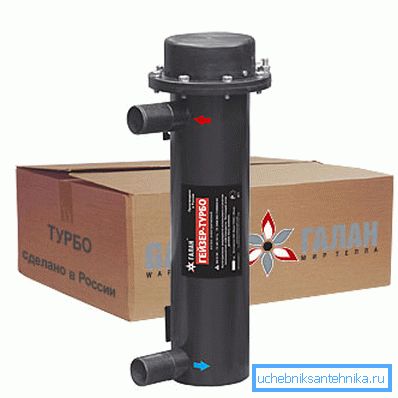
Option 3. Liquid fuel
The only positive thing when choosing such equipment is high power and high efficiency.
However, water heating boilers operating on diesel fuel, have many disadvantages, calling into question the benefits mentioned above:
- to store a large amount of fuel on which the boiler operates, a volume tank is needed, where a certain temperature must be maintained, otherwise diesel fuel will become viscous and will clog filters;
- during operation, the boiler produces a strong noise and an unpleasant odor, which is why the boiler house must be arranged not in the house, but to use a special, separate structure for this.

This model of the boiler can be recommended only in the case when there is no possibility of using alternatives.
Option 4. Solid fuel
Heating equipment of this type is used because of the cheapness of firewood or coal in some regions of our country. In addition, if there is a forest growing near your cottage, you can stock up on wood for free.
The great disadvantages of such equipment are:
- very low efficiency - most of the heat energy “flies into the pipe” and does not heat the coolant;
- inconvenience of use - the boiler requires constant attention from the person who must periodically fill the combustion chamber with fuel.
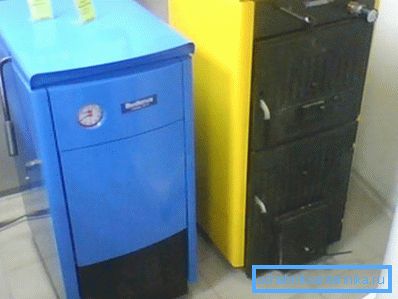
Option 5. Hydrogen
This is an innovative eco-friendly way of space heating, which is just beginning to gain popularity. Hydrogen boilers operate on a catalytic principle: as a result of a special chemical reaction that occurs between hydrogen and oxygen, water and a large amount of thermal energy is released, which can be used to heat the coolant.
The efficiency of the boiler is 96%. A particular advantage of this solution is modularity: depending on the area of the rooms that need to be heated, you can choose a boiler with one, two or more channels, gradually increasing power.

Option 6. On several types of energy carriers
As already mentioned, modern industry produces boilers operating on several types of fuel. They are perfect for installation in areas where there are problems with the supply of a particular type of fuel.
In this case, most of the time, the heater operates, for example, on gas, and in the event of its shutdown, the heating medium can be heated with electricity. The advantage is that you do not need to install additional heating elements in the rooms: electric heating convectors, infrared radiators, and so on.
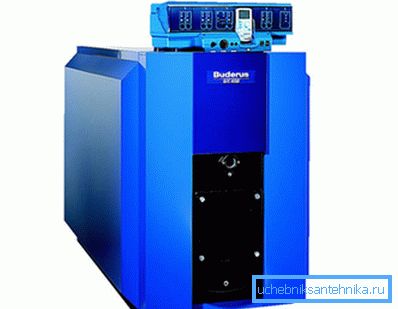
Conclusion
It is necessary to buy a heating boiler on the basis of the possibility of organizing the delivery of a particular type of fuel. Naturally, the most economical option is gas, but in the absence of a gas pipeline it will be impossible to implement such a heating scheme.
However, there are alternative, including energy-saving solutions: the installation of heat pumps, solar collectors and so on. You can learn more about this from the video below.